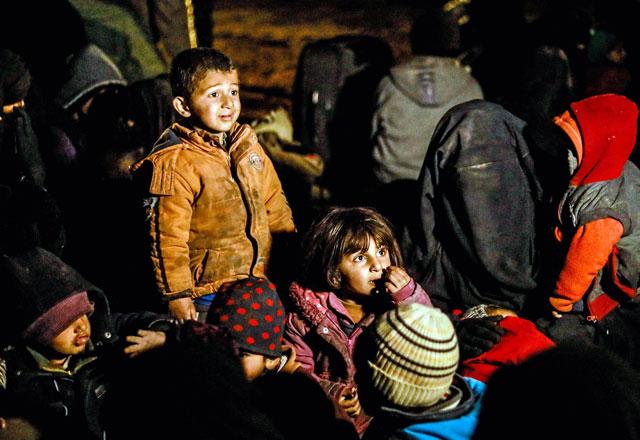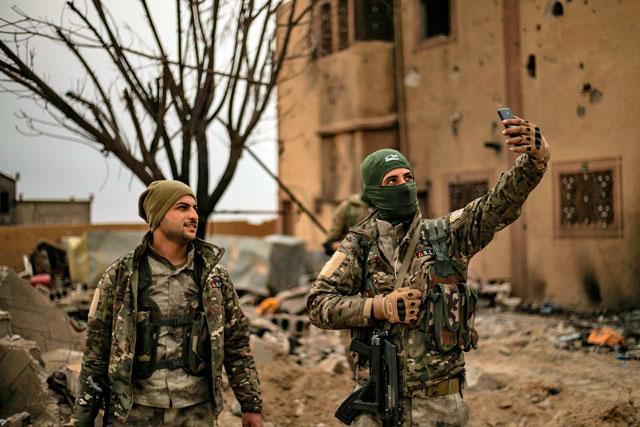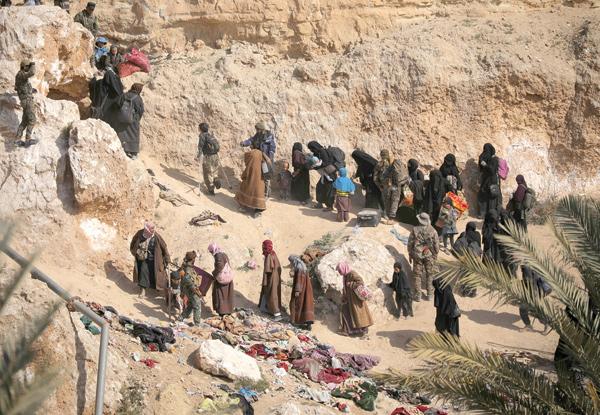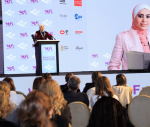You are here
Daesh 'caliphate' down to 1% as final assault nears
By AFP - Feb 07,2019 - Last updated at Feb 07,2019
BEIRUT — The Daesh group's "caliphate" has shrunk to less than 1 per cent of its original size, the US-led coalition said on Thursday, as a final onslaught in eastern Syria loomed.
Kurdish-led forces spearheading the offensive have paused operations but US President Donald on Trump predicted on Wednesday that a final declaration of victory would come next week.
At its height, the extremist proto-state proclaimed by Daesh in June 2014 straddled swathes of land in Syria and Iraq and was roughly the size of Britain.
Major General Christopher Ghika, the coalition's deputy commander, described the size of the last Daesh pocket as "now less than one per cent of the original caliphate".
The coalition has been training and providing aerial support to the Syrian Democratic Forces (SDF), which launched an offensive on the last patch of extremist territory in September 2018.
Two months later, they took Hajin, which was the last town of note under Daesh control and left the militants fighting over a scattering of hamlets in the Euphrates River Valley.
Thousands of suspected Daesh fighters have attempted to blend in with civilians fleeing the extremist group’s battered last bastion, including a large number of foreigners.
“They are attempting to escape through intermixing with the innocent women and children attempting to flee the fighting,” Ghika said in a statement.
‘Next week’
The SDF have set up screening centres to process the droves of haggard people streaming out of Daesh-held territory, often famished and covered in dust.
US, French, British and other forces are also actively looking for wanted Daesh operatives among those fleeing the combat zone with civilians.
After weeks of advancing steadily, the SDF halted their ground assault on Daesh’s tiny remaining enclave last week, saying the jihadists were increasingly using civilians as human shields.
The Kurds, who have de facto semi-autonomy in northeastern Syria, are also engaged in behind-the-scenes diplomatic talks over the fate of the region.
Trump said in December that he had ordered a complete troop withdrawal from Syria, a shock announcement that left the Kurds scrambling for new allies.
Speaking at the State Department on Wednesday, Trump said that US-led troops and their Kurdish allies should formally announce the end of the “caliphate” some time next week.
“Remnants — that’s all they have, remnants — but remnants can be very dangerous,” Trump said.
“Rest assured, we’ll do what it takes to defeat every ounce and every last person within the ISIS madness” he said, using another acronym for Daesh.
While Daesh will soon no longer have fixed positions anywhere in Iraq or Syria, its surviving fighters have reverted to guerrilla warfare and remain a potent force.
The extremists maintain sleeper cells, including along the border with Iraq as well as in cities they once ruled, and have carried out periodic hit-and-run attacks.
The SDF arrested 63 suspected militants in the Syrian city of Raqqa on Thursday during an operation against terrorist sleeper cells, it said in a statement.
At least 48 suspected Daesh members were among them, according to the Britain-based Syrian Observatory for Human Rights.
The observatory says that suspected Daesh sleeper cells have allegedly assassinated at least 50 civilians and 135 SDF fighters in Kurdish-held territory since August.
No ‘transparency’
More than 37,000 people, mostly wives and children of extremist fighters, have fled Daesh territory since the SDF, backed by the US-led coalition, intensified its offensive in December, according to the observatory.
The Britain-based war monitor has said that figure includes some 3,200 suspected militants.
Kurdish authorities say they have in their custody hundreds of foreign male Daesh members.
SDF spokesman Mustefa Bali told AFP on Wednesday that his group is detaining foreign Daesh fighters on a “daily basis”.
Suspected militants captured by the SDF are usually eager to be sent home, something the Kurdish administration also wants.
Governments in the jihadists’ countries of origin are often reluctant, although France — which has one of the largest contingents — recently said it would consider limited repatriations.
Human Rights Watch (HRW) has warned that any transfers of suspected foreign jihadists and their relatives out of Syria should be transparent.
“We would definitely like to be present [during the transfer] or at least there should be some transparency,” Nadim Houry, HRW’s director of counterterrorism, told AFP in the northern Syrian town of Amuda.
“As we speak, there may already be transfers happening. There’s been a total lack of transparency, and bad things happen in the dark,” he warned.
Related Articles
NEAR BAGHOUZ, Syria — US-backed forces in eastern Syria on Tuesday screened and treated truckloads of suspected extremists and relatives who
BAGHOUZ, Syria — Dozens of Daesh group extremists emerged from tunnels to surrender to US-backed forces in eastern Syria on Sunday, a day af
BAGHOUZ, Syria — Daesh group fighters launched suicide attacks Wednesday at US-backed Syrian forces in a desperate bid to defend their last



















